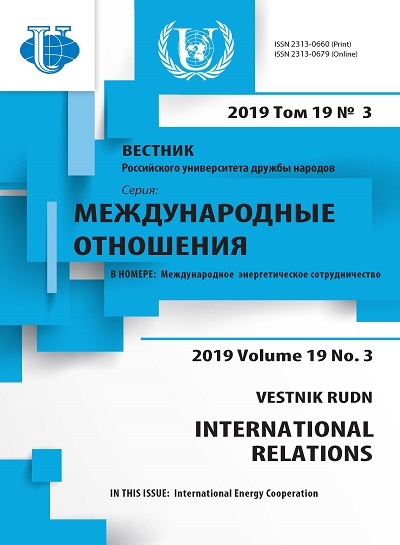Influence of Energy Factor on International Relations System of Latin America in the 21st century
- Authors: Jeifets V.L.1, Pravdiuk D.A.1
-
Affiliations:
- Saint-Petersburg State University
- Issue: Vol 19, No 3 (2019): International Energy Cooperation
- Pages: 354-367
- Section: THEMATIC DOSSIER
- URL: https://journals.rudn.ru/international-relations/article/view/22586
- DOI: https://doi.org/10.22363/2313-0660-2019-19-3-354-367
- ID: 22586
Cite item
Full Text
Abstract
Relation between oil trade and political regimes, climate change and problems of managing natural resources, mining technologies and fighting corruption and many others constitute the phenomenon of a multicomponent energy policy, the study of which is located at the intersection of natural and social sciences. Latin American region has large hydrocarbon reserves, huge hydropower potential, as well as significant opportunities to generate wind and solar energy. Historically, Latin America has occupied a small share of world energy production - about 5 %, where Venezuela, Mexico and Brazil have long been the only players of a global level. However, in the 21st century, factors such as the discovery of pre-salt oil deposits in Brazil, promising forecasts for the development of alternative gas sources in Argentina and the opening of Mexican oil industry for foreign companies after more than seventy years of the monopoly of Pemex, gave an additional impetus to the development of oil and gas industries of the region. The close relationship between energy industry and political context of a number of Latin American countries makes the region’s energy market less predictable, as changes cannot be predicted using standard industry analysis tools. This article analyzes the most significant episodes of political intervention - external or internal - to the energy industry in the 21st century, as well as the impact that events and decisions in this industry had on the regional policy. The authors analyze distinctive examples of the interconnectedness of these areas, from the “resource diplomacy” of Venezuela to the decisive actions of A.M. Lopez Obrador in Mexican energy in the first months of his presidency, and draw parallels between the chains of events in politics and energy. As the cases of Brazil, Mexico, Bolivia, and Venezuela, cited in the article, show, the cost of error becomes extremely high when its consequences can destabilize both sectors due to their close interweaving.
Keywords
About the authors
Viktor Lazarevich Jeifets
Saint-Petersburg State University
Author for correspondence.
Email: jeifets@gmail.com
PhD, Dr. of Science (History), Professor of the RAS, Director of Center for Ibero-American Studies
Saint-Petersburg, Russian FederationDaria Antonovna Pravdiuk
Saint-Petersburg State University
Email: dariapravdiuk@gmail.com
postgraduate student, School of International Relations
Saint-Petersburg, Russian FederationReferences
- Arraras, A. & Deheza, G. (2005). Referéndum del Gas en Bolivia 2004: Mucho Más Que un Referéndum. Revista de Ciencia Política, 25 (2), 161—172.
- Balderas Zavala, R. & Tapia Ornelas, M. (2019). Algunos de los Rasgos Populistas de AMLO. El Cotidiano, 34 (213), 28—36.
- Bastos, E.S., Rosa, M.P. & Pimenta, M.M. (2016). Os Impactos da Operação Lava Jato e da Crise Internacional do Petróleo nos Retorno Anormais e Indicadores Contábeis da Petrobras 2012—2015. Pensar Contábil, 18 (67), 49—56.
- Berrios, R. & Marak, A. (2010). Explaining Hydrocarbon Nationalization in Latin America: Economics and Political Ideology. Review of International Political Economy, 18 (5), 673—697. doi: 10.1080/09692290.2010.493733
- Boreiko, A.V. (2016). Cuba and Venezuela: Mutually Beneficial Cooperation in the Socio-Economic Sphere. Latin America, 6, 61—71. (In Russian).
- Brunner, C.T. (1930). The Problem of Oil. London: Benn Ltd.
- Davydov, V.M. & Yakovlev, P.P. (Eds.). (2014). Mexico: Energy Sector Reform. Moscow: ILA RAS publ. (In Russian).
- Eremin, S.V. (2018). Problems and Prospects for the Integration of Natural Gas Markets in South America. Latin America, 4, 23—36. (In Russian).
- Fontaine, G., Narvaez, I. & Velasco, S. (2017). Explaining a Policy Paradigm Shift: A Comparison of Resource Nationalism in Bolivia and Peru. Journal of Comparative Policy Analysis Research and Practice, 20 (2), 142—157. doi: 10.1080/13876988.2016.1272234
- Gantz, D. (2019). The U.S.-Mexico Trade Relationship under AMLO: Challenges and Opportunities. Arizona Legal Studies Discussion Paper, 19-06. URL: https://ssrn.com/abstract=3377591 (accessed: 12.05.2019).
- Gilpin, R. (1981). War and Change in World Politics. Cambridge: Cambridge University Press.
- Khalitov, B.N. (2007). Energy Diplomacy of the Bolivarian Government of Venezuela. Latin America, 10, 28—35. (In Russian).
- Kheifets, L.S. & Pravdiuk, D.A. (2019). The Decision of the Hague Court in the Case of Bolivia vs. Chile: Content and Significance. Latin America, 2, 54—64. (In Russian). doi: 10.31857/S0044748X0003712-2
- Krasner, S.D. (1978). Defending the National Interest: Raw Materials Investments and U.S. Foreign Policy. Princeton, NJ: Princeton University Press.
- Morgenthau, H.J. (1963). Politics among Nations: The Struggle for Power and Peace. New York: Alfred A. Knopf.
- Muhr, T. (2010). Counter-Hegemonic Regionalism and Higher Education for All: Venezuela and the ALBA. Globalisation, Societies and Education, 8 (1), 39—57. doi: 10.1080/14767720903574041
- Ojeda Kalluni, E. & Chadaeva, E.A. (2018). Energy Reform in Mexico: Experience and Lessons for Transforming South America’s Energy Sector. RUDN Journal of Economics, 26 (4), 609—619. (In Russian). doi: 10.22363/2313-23292018-26-4-609-619
- Perdoza, L. (2019). AMLO’s First 100 Days: Mixed Signals. GIGA Working Paper. URL: https://nbn-resolving.org/ urn:nbn:de:0168-ssoar-61810-3 (accessed: 13.05.2019).
- Ramirez-Cendrero, J.M. & Jose Paz, M. (2016). Oil Fiscal Regimes and National Oil Companies: A Comparison between Pemex and Petrobra. Energy Policy, 101, 473—483. doi: 10.1016/j.enpol.2016.11.009
- Ryazanova, M.O. (2016). Economic Aspects of Brazil’s Energy Security. Latin America, 7, 43—56. (In Russian).
- Shkolyar, N.A. (2016). Problems of Reforming the Petroleum Industry in Mexico. Latin America, 11, 35—42. (In Russian).
- Velez-Ocampo, J., Govindan, K., Gonzalez-Perez, M. & Herrera-Cano, C. (2017). Nationalisation and Privatisation in State-Owned Oil Multilatinas. International Journal of Business and Emerging Markets, 9 (3), 302—328. doi: 10.1504/IJBEM.2017.10007669
- Vesnovskaya, E.I. & Borzova, A.Yu. (2015). Venezuela’s Approaches to Ensuring the Energy Security of Latin America. Vestnik RUDN. International Relations, 15 (4), 103—110. (In Russian).
- Yakovleva, N.M. & Yakovlev, P.P. (2012). Big Oil Game. Reasons and Consequences of YPF Company Nationalization. Latin America, 12, 27—42. (In Russian).
Supplementary files










